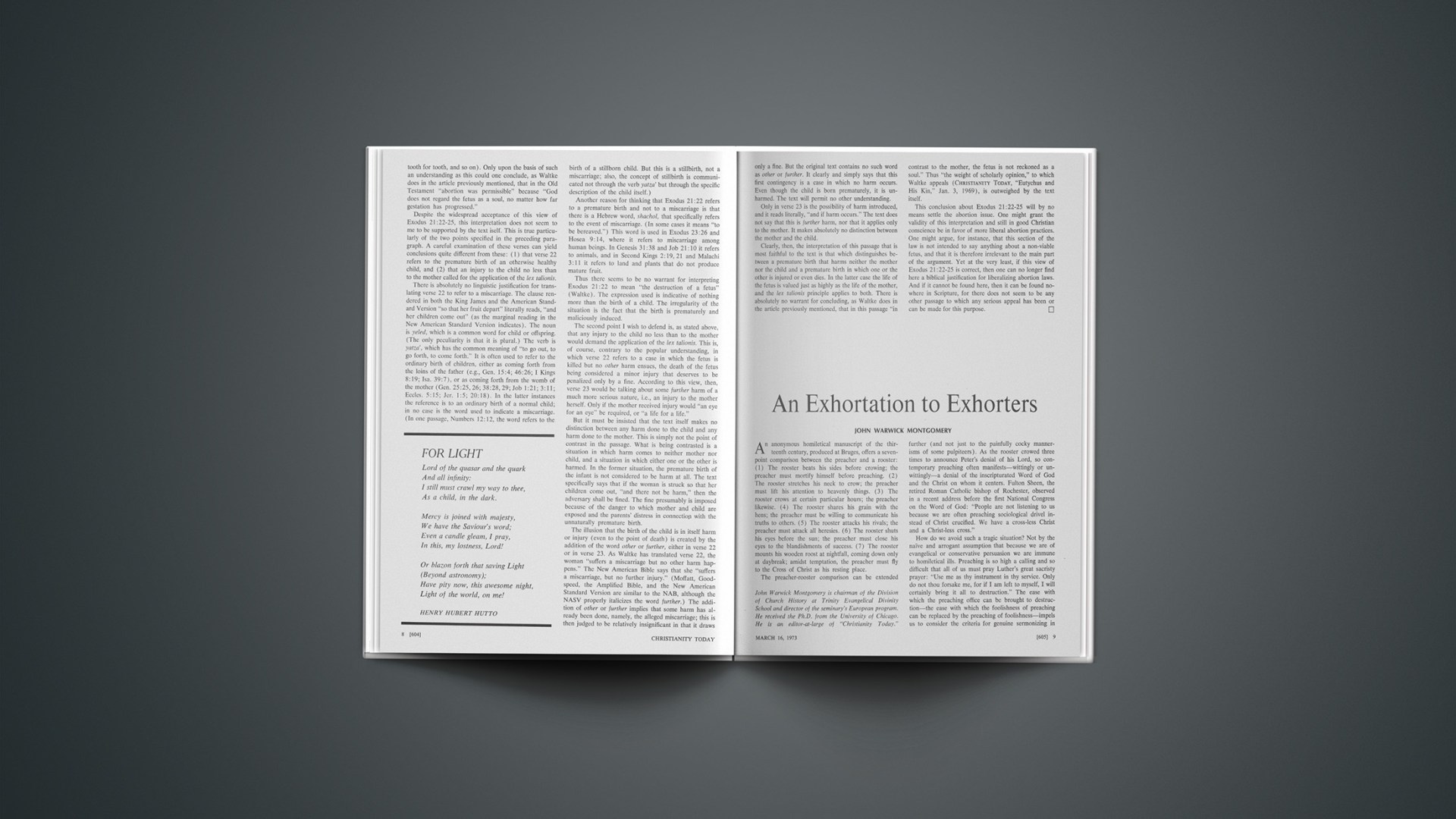An anonymous homiletical manuscript of the thirteenth century, produced at Bruges, offers a seven-point comparison between the preacher and a rooster: (1) The rooster beats his sides before crowing; the preacher must mortify himself before preaching. (2) The rooster stretches his neck to crow; the preacher must lift his attention to heavenly things. (3) The rooster crows at certain particular hours; the preacher likewise. (4) The rooster shares his grain with the hens; the preacher must be willing to communicate his truths to others. (5) The rooster attacks his rivals; the preacher must attack all heresies. (6) The rooster shuts his eyes before the sun; the preacher must close his eyes to the blandishments of success. (7) The rooster mounts his wooden roost at nightfall, coming down only at daybreak; amidst temptation, the preacher must fly to the Cross of Christ as his resting place.
The preacher-rooster comparison can be extended further (and not just to the painfully cocky mannerisms of some pulpiteers). As the rooster crowed three times to announce Peter’s denial of his Lord, so contemporary preaching often manifests—wittingly or unwittingly—a denial of the inscripturated Word of God and the Christ on whom it centers. Fulton Sheen, the retired Roman Catholic bishop of Rochester, observed in a recent address before the first National Congress on the Word of God: “People are not listening to us because we are often preaching sociological drivel instead of Christ crucified. We have a cross-less Christ and a Christ-less cross.”
How do we avoid such a tragic situation? Not by the naïve and arrogant assumption that because we are of evangelical or conservative persuasion we are immune to homiletical ills. Preaching is so high a calling and so difficult that all of us must pray Luther’s great sacristy prayer: “Use me as thy instrument in thy service. Only do not thou forsake me, for if I am left to myself, I will certainly bring it all to destruction.” The ease with which the preaching office can be brought to destruction—the ease with which the foolishness of preaching can be replaced by the preaching of foolishness—impels us to consider the criteria for genuine sermonizing in today’s world. These are: the essentiality of the Word, the irreducibility of Law and Gospel, and the centrality of Christ.
1. The essentiality of the Word. In the simplest terms: no Word, no preacher. What distinguishes a preacher from an orator or lecturer is not the organization of his discourse or his style of presentation; historians of rhetoric have definitively shown that preachers use the preparatory techniques and methods of delivery common to all formal public speaking. The distinguishing mark of the preacher lies in the content of his remarks: unlike all other public speakers, he claims to convey a divine truth, not human opinion—a given that has absolute, apodictic force, not a tentative presentation of his own opinions or those of other finite and fallible creatures. All other speakers say, “Thus hypothesizes man”; the preacher cries: “Thus saith the Lord.”
When contemporary preachers disregard their true calling as messengers who have the unsearchable riches of Christ to proclaim, they quickly bore their listeners with their own limited and definitely searchable ideas—and the listeners cease to listen. No Word, no preaching. And from this formula follow three corollaries.
First, all genuine preaching is expository preaching. This does not mean that a sermon cannot focus on the central theme of a passage rather than on every verse individually, or that proper sermonic themes cannot bring together insights from many texts of Scripture. What this means is that every true sermon presents biblical content, and thus demands the exposition of God’s written Word. Chrysostom quite properly noted that the value of expository preaching lies in the fact that here “God speaks much and man little.”
The great theologian Reu put the matter well:
That which edifies is, in the last instance, not the mental ability of the preacher, but the divine Word alone. Wealth of ideas, psychological skill, beauty of language, charm of delivery, have their value in the awakening of interest, and should be sought after by the preacher, but they cannot produce nor strengthen justifying faith. This is done solely by the edifying power of the Word of God [Homiletics, 1922, p. 127].
God’s promise attaches to the proclamation of his Word, and to no other proclamation. Only when the preacher functions as messenger can he be sure of his relevance.
Corollary two: Every preacher must be an exegete, and the more he exegetes, the more genuinely he preaches. If the Word of God is the true source of the preacher’s insights, he must expound it; but to expound it he must understand it, and since it comes to him in written language, he must analyze it linguistically. Here there is no substitute for a knowledge of the original languages of Scripture. To rely on translations and commentaries is to be forever at the mercy of secondary authorities. Luther was convinced that the lack of knowledge of the biblical languages was the major reason why the medieval church fell away from the Gospel: preachers and theologians came to rely on the opinions of men (commentaries on commentaries on commentaries) instead of hearing God himself speak through holy men of old whom he inspired. In his great educational mandate, To the Mayors and Aidermen of All the Cities of Germany in Behalf of Christian Schools (1524), Luther wrote:
We will not preserve the Gospel without the languages.… In comparison with the glosses of the fathers, the languages are as sunlight to darkness.… Preaching is sluggish and weak, and the people finally become weary and fall away. But a knowledge of the languages renders it lively and strong, and faith finds itself constantly renewed through rich and varied instruction.
The third corollary of the essential function of the Word to the preaching office is rejection of contemporary theology’s so-called hermeneutical circle. In his exegesis, the preacher must not make the appalling mistake of thinking, as do followers of the Bultmannian and post-Bultmannian “new hermeneutic,” that the text and one’s own experience enter into a relation of mutuality, and that this “Word-event,” not an objective divine message in the text, is the proper substance of preaching. To bind text and exegete into a circle is not only to pull all theology and preaching into the orbit of anthropocentric sinfulness but also to remove in principle the very possibility of a “more sure word of prophecy” than the vagaries of men. Preaching ceases, for God stutters, and mankind is left with no clear remedy for the human predicament. Grady Davis, one of the best contemporary theoreticians of the sermon, leaves no room for the hermeneutical circle when he insists that the preacher must “adjust his thinking to Scripture’s real idea, not adjust Scripture’s words to fit his thinking” (Design For Preaching). This is the very essence of the Word’s essentiality.
2. The irreducibility of Law and Gospel. Even when sermons are expository and exegetical, the Divine Word may not be conveyed. How is this possible? It occurs when the overall purpose and thrust of the Bible are missed. This problem is endemic in evangelical circles and warrants close attention.
One of the few theologically praiseworthy remarks made by the late Harry Emerson Fosdick was his comment that some preachers think the congregation arrives on Sunday morning panting to hear the history of the Amalekites. Fosdick didn’t believe that what Scripture says about the Amalekites was God-inspired, of course, but his criticism of “Amalekite sermons” is still valid. Although the Bible speaks inerrantly on this subject as on all others it touches, the grand purpose of Scripture is to present salvation as centering on God’s Son. Any preaching that loses the Tree of Life among the other trees in the biblical forest is merely an exercise. A sermon—however carefully done—that describes all the animals mentioned in the Book of Isaiah is a lesson in homiletical pedantry.
How do we avoid this pitfall? First, by properly distinguishing Law and Gospel. Throughout Scripture, God informs us of his standards (the Law) and offers us his free and unmerited grace (the Gospel). The purpose of the Law is principally to drive us to Christ (Gal. 3:24) by showing us how far we fall short of his revealed will for us. The Gospel picks up the sinner made contrite by the Law and offers him peace with God through the merits of Jesus Christ.
Tragically, however, evangelical sermons often neglect either Law or Gospel or both in their emphasis on enlarging the congregation’s theological knowledge (eschatology, demonology, dispensations, and so on) that the hearers are not brought to conviction or to the Cross. Also, Law and Gospel are often confused, in that, as C. F. W. Walther commented, “Christ is represented as a new Moses, or Lawgiver,” or “the Law is preached to those who are already in terror on account of their sins, or the Gospel to those who live securely in their sins” (The Proper Distinction Between Law and Gospel). By preaching Law (not infrequently an extra-biblical law at that) to those ready for the Gospel, we turn the free offer of salvation into legalistic works-righteousness. By neglecting to preach Law to the unrepentant, and substituting sticky-sweet gospel songs and joy-bell testimonies, we set before the non-Christian what Bonhoeffer well characterized as “cheap grace.”
Perhaps the saddest misunderstanding of the proper relation between Law and Gospel comes when the preacher does not allow the Gospel to predominate. To express it differently, sermons must focus on the Christ, for “the law was given by Moses, but grace and truth came by Jesus Christ” (John 1:17). This brings us to our final criterion for genuine sermonizing:
3. The centrality of Christ. A widely held conviction among the Reformers was that “the whole Scripture presents Christ everywhere.” We have lost that perspective in some quarters, even when the formal authority of the Bible is still upheld. But the Jehovah’s Witnesses ought to remind us that a high view of scriptural authority without an adequate understanding of or emphasis on the Scripture’s central teachings is of little real value.
If we agree that the preacher must by the very nature of his calling be an exegete, let us also use our exegetical skills to do what the risen Christ did on the road to Emmaus: beginning at Moses and all the prophets, expound in all the Scriptures the things concerning Christ himself (Luke 24:27).
George M. Marsden is associate professor of history at Calvin College, Grand Rapids, Michigan. He has the Ph.D. (Yale University) and has written “The Evangelical Mind and the New School Presbyterian Experience.”










